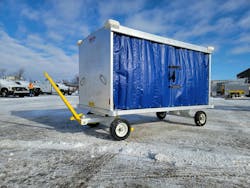Aluminum’s Ability to Withstand Harsh Environments
Engineers at Wilcox GSE designed a baggage cart made of aluminum with a goal of reducing the weight of the equipment, improving operational costs, lowering maintenance requirements and being more environmentally friendly.
However, there was skepticism that the aluminum versions would be as resilient as steel models. So, two years ago, Wilcox GSE deployed its first two Aluminum Baggage Carts with a discerning eye on their durability.
“Our first Aluminum Baggage Carts were provided to GAT Airline Ground Support in Salt Lake City, Utah, and GTA dnata in Toronto, Ontario,” Ashley Gooyers, marketing specialist at Wilcox GSE says. “This was a great opportunity for us, as it enabled us to test out our new baggage carts in completely different markets.”
GAT Airline Ground Support and GTA dnata were asked which airports had the highest equipment demands as Wilcox GSE leaders wanted to test the durability of the Aluminum Baggage Carts in high-impact environments.
With Salt Lake City and Toronto identified, Wilcox vice president David Dick traveled to each location every three months through the trial periods to inspect the equipment and gauge how it was fairing.
“This gave us a better understanding of how the baggage carts were being used and treated, as well as how they were standing up to the grueling environments they were being subjected to,” Gooyers notes.
Company officials are thrilled with the result of these first deployments, even showcasing one of the original units in its current condition at the 2023 International GSE Expo in Las Vegas.
The First Trials
The Aluminum Baggage Carts were used heavily during the trial period in rugged environments. Wilcox GSE officials point out there were no concessions for the aluminum models, and they were used the same as steel baggage carts.
At each airport, one Aluminum Baggage Cart was tested and used in tandem with the ground handlers’ regular carts.
“This gave us a true testing environment to better understand how the baggage carts would hold up in the demanding markets as well as in comparison with their steel counterparts,” Gooyers notes. “This also allowed us to make any necessary tweaks and adjustments to the design without major overhaul to a fleet during the trial period.”
Available in two models – a closed baggage cart and an open baggage cart – the main structure of the cart, including the floor, sides and roof, are all manufactured from previously recycled aluminum.
“Over the lifespan of the unit, the operating cost will be lower when using aluminum baggage carts. Tires will last longer, hubs will last longer, they will never need to be repainted,” Dick says. “When it comes time for the cart retirement, the cart can be sent to be recycled and turned into another new product.”
Wilcox GSE’s closed baggage cart is 5 feet by 10 feet and fully enclosed with curtains on both sides of the cart, while the open baggage cart is 5 feet by 10 feet and half height sides on both ends of the cart.
Utilizing a tubular structural design, additional features of the aluminum baggage carts include a peaked roof with drip rails to channel water to the ends of the cart; top corner bumpers; outside rub rail bumpers; and e-hitch. The closed cart baggage cart includes an anti-lock curtain rail system.
“Both environments were also testing the durability in different extreme climates from dry and humid heat to cold and wet winters,” Gooyers says. “While it was expected by our customers that the aluminum would not fare well in the ever-changing climate, they were pleasantly surprised by the durability and dependability of the equipment they purchased.”
Customer Feedback
Despite doubts that the Aluminum Baggage Carts would last, both units stood up overall to both the usage and climate in each location.
“In Salt Lake City specifically, the products didn’t look worn or used/damaged even after being filled with skis all winter long,” Gooyers says, noting the carts’ heavy usage as they were continuously filled during the peak travel seasons in the area.
“Both cities were using the carts on a regular basis during the trial, so there was no mistaking the durability and dependability of the products,” they add. “The most common response we hear from our customers is how very surprised and impressed they are with how well the carts are still holding up, even after rigorous use in the field.”
Gooyers says the unit’s lightweight design has garnered favorable feedback in regard to safety. The Aluminum Baggage Carts weigh 500 pounds less than steel counterparts, according to Wilcox GSE, which helps with ergonomics and manual manipulation.
“This also opens up many doors when it comes to transportation and the evolution of electric vehicles in the industry,” Gooyers says. “This allows for greater functionality whether man or machine is moving the carts.”
Based on feedback from the trials, officials at Wilcox GSE were able to improve some design features. For example, the cart deployed in Salt Lake City didn’t have rubber suspension. A vibration isolation system was implemented in Toronto and has since been rolled out into other Aluminum Baggage Carts.
“This helps stabilize the carts and the load to significantly reduce vibration and shaking while in motion,” Gooyers says.
“The original design also had rear axles that were aluminum in design,” they continue. “But after testing in the field, the design was adjusted and now both axles are made of steel and bolted in place for added strength and durability.
“Some minor changes were made to the gusset and tubing and how curtains were installed for better functionality and overall longevity use.”
The Aluminum Baggage Carts did not require any noteworthy maintenance during their initial deployment beyond standard daily inspections and safety protocols.
Following the initial deployments, Wilcox GSE has sent additional Aluminum Baggage Carts to customers across North America.
“They are starting to gain momentum. While there are still doubts about aluminum in the industry, we are continuing to grow traction as sustainability becomes more important in the market,” Gooyers says. “With electric equipment starting to replace other fuel options, Aluminum Baggage Carts are ideal for lighter weight hauling and more efficient battery usage.”
About the Author
Josh Smith
Editor
Josh Smith served as editor of Ground Support Worldwide as editor from 2016 through 2024. He oversaw production of the print magazine, created GSW's newsletters on a daily basis, and updated the latest news on AviationPros.com.

